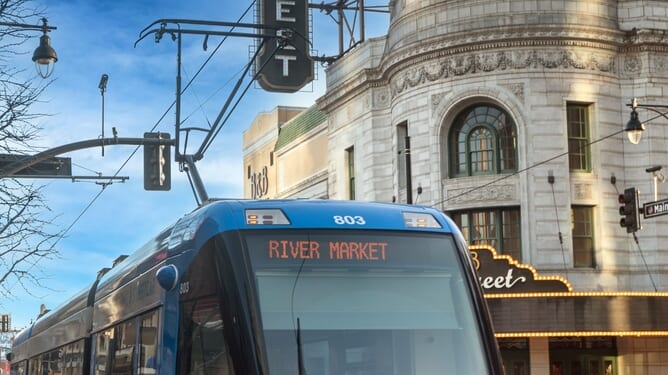On Monday, KCUR carried a piece by NPR’s Joel Rose exploring fare-free buses in New York City, using Kansas City’s own experiment as a case study. After presenting the policy’s advocates, Rose shifted gears:
Then there’s Kansas City. The regional transit authority eliminated fares in 2020, but it did not go exactly as local leaders had hoped.
“We just never found a sustainable funding source to replace the $10 million a year out of the fare box,” said Eric Bunch, a city councilman in Kansas City, Mo., and a board member of the Kansas City Area Transportation Authority.
Rose also included perspectives from urban transit researchers, who note that reducing fares is less critical than improving service speed, frequency, and reliability.
For KCUR’s audience, Rose’s framing may have come as a surprise. While the station occasionally raised funding concerns, it largely avoided discussing how fare elimination could affect service.
In late 2019, a KCUR piece quoted then-Councilwoman Kathryn Shields, who lead the council’s finance committee, as pointing out that no one was addressing how to offset losses at the farebox. Instead, KCUR’s early coverage framed zero fare as a breakthrough, not a policy gamble — quoting advocates and then-KCATA leader Robbie Makinen extensively while declining to examine the underlying “research” he invoked.
None of the KCUR reporting during the debate seriously contended with the service impact of zero fare. None sought out urban transit researchers, as Rose did. None considered the so-called research that Makinen cited in support of the policy. KCUR’s framing heavily favored advocates—including an exceedingly fawning piece on Makinen himself—and did not interrogate claimed benefits.
In May, 2021, KCUR quoted Makinen as saying, “When [zero fare] started, everyone said it wouldn’t work, I believe we’ve proved them wrong.” His confidence was premature.
Early in the debate, research, ridership surveys, and national reporting—some of which I cited in a January 2020 Kansas City Star column—already pointed to the risks of fare-free transit.
KCUR’s most direct acknowledgment of fare-free drawbacks came belatedly, in 2022, when it reprinted a story from The Beacon on unreliable service and long waits faced by bus riders. KCUR’s own reporters only asked, “Should Kansas City Keep Buses Free?” in 2023 when the damage was evident.
Back in that December 2019 piece, KCUR quoted then-Councilman Kevin McManus as saying, “When we take the fareboxes away, nobody wants to be on this council putting them back.” Six years later, six of the 13 council members who voted to remove fares in 2019 voted to reinstate them in 2025.
KCUR deserves credit for eventually publishing more substantive fare-free coverage. But had this level of scrutiny come earlier—before the rise in operator assaults, service cuts, and staffing concerns—the public conversation might have been far more informed. Policymakers might have avoided their embarrassing reversals. And the harmful impact to those who depend on public transit might have been reduced, or avoided altogether.










